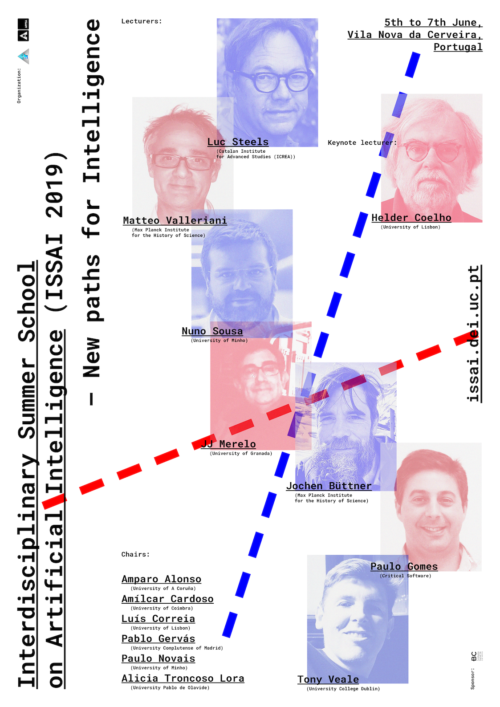*** Please distribute, apologies for cross-posting ***
*** DEADLINE EXTENDED TO April 30, 2019 ***
10th Thematic Track on
MultiAgent Systems: Theory and Applications (MASTA @ EPIA2019)
3-6 September 2019, Vila Real, Portugal
———-
CALL FOR PAPERS
———-
Aims and Scope
Research on Multi-Agent Systems (MAS) has a vigorous, exciting tradition and has led to important theories and systems. However, new trends and concerns are still emerging and form the basis of current and future research. The 10th thematic track on “MultiAgent Systems: Theory and Applications”, to take place at EPIA 2019, and will provide a discussion forum on the most recent and innovative work in all areas of MAS.
The unifying focus of the thematic track will be on methodological aspects. Both theoretical and practical research should be situated in the context of existing or new methodologies. This will not preclude any specific topic, but preference will be given to research work that establishes some connection with the methodological aspects or to successful applications built upon some methodology.
Topics
Topics of interest include, but are not limited to:
-
Agent theories, architectures and models
-
Agent-based systems Interoperability
-
Agreement technologies
-
Applications of agents and MAS (industrial and commercial)
-
Artificial social systems
-
Automated negotiation and computational argumentation
-
Cognitive models, including emotions and philosophies
-
Communication: languages, semantics, protocols, and conversations
-
Cooperation, coordination and teamwork in MAS
-
Ethical and legal issues raised by autonomous agents and MAS
-
Formal methods for modelling agents and agent-based systems
-
Human-agent interaction
-
Learning in MAS
-
Multiagent evolution, emergent behavior and adaptation
-
Multiagent modelling and simulation
-
Scalability and performance of MAS
-
Societal issues: organizations, institutions, norms, socio-technical systems
-
Trust, reputation, privacy and security
Paper Submission Instructions
All accepted papers will be published by Springer in a volume of Springer’s Lecture Notes in Artificial Intelligence (LNAI) corresponding to the proceedings of the 19th EPIA Conference on Artificial Intelligence, EPIA 2019.
Submissions must be original and not published elsewhere. Papers should not exceed twelve (12) pages in length and must adhere to the formatting instructions of the conference. Each submission will be peer-reviewed by at least three members of the Program Committee. The reviewing process is double blind, so authors should remove names and affiliations from the submitted papers, and must take reasonable care to assure anonymity during the review process. References to own work may be included in the paper, as long as referred to in the third person. Acceptance will be based on the paper’s significance, technical quality, clarity, relevance and originality. All accepted papers must be presented orally the conference by one of the authors and at least one author of each accepted paper must register for the conference.
This track also accepts short papers submissions (maximum of 6 pages) for position papers, work in progress and application/demonstration papers. The registration fee is the same for regular and short papers. In case of acceptance, authors will have the same time for paper presentation.
All papers should be submitted in PDF format through the EPIA 2019 EasyChair submission page. Prospective authors should select the thematic track to which their paper is to be submitted.
Important Dates
Paper submission deadline: April 15, 2019 April 30, 2019
Notification of paper acceptance: May 31, 2019
Camera-ready papers deadline: June 15, 2019
Conference dates: September 3-6, 2019
Organizing Committee
Henrique Lopes Cardoso (hlc@fe.up.pt), FEUP / LIACC
Viviane Torres da Silva (vivianet@br.ibm.com), IBM Research Brazil
Dave de Jonge (davedejonge@iiia.csic.es), IIIA-CSIC, Spain
Luís Antunes (lantunes@fc.ul.pt), FCUL / BioISI
Steering Committee
Eugénio Oliveira (eco@fe.up.pt), FEUP / LIACC
Hélder Coelho (hcoelho@di.fc.ul.pt), FCUL
João Balsa (jbalsa@di.fc.ul.pt), FCUL
Luís Paulo Reis (lpreis@fe.up.pt), FEUP / LIACC
Program Committee
Adriana Giret, Universitat Politecnica de Valencia, Spain
Alberto Fernandez, Universidad Rey Juan Carlos, Spain
Alejandro Guerra-Hernández, Universidad Veracruzana, Mexico
Ana Paula Rocha, Universidade do Porto, Portugal
Andrea Omicini, Università di Bologna, Italy
António Castro, TAP Air Portugal + LIACC, Portugal
Carlos Carrascosa, GTI-IA DSIC Universidad Politecnica de Valencia, Spain
Carlos Martinho, Instituto Superior Técnico, Portugal
Daniel Silva, University of Porto, Portugal
Diana Adamatti, Universidade Federal do Rio Grande (FURG), Brazil
F. Jordan Srour, American University of Beirut, Lebanon
Francisco Grimaldo, Universidad de Valencia, Spain
Jaime Sichman, Universidade de São Paulo, Brazil
Javier Carbó, Universidad Carlos III Madrid, Spain
João Leite, Universidade Nova de Lisboa, Portugal
John-Jules Meyer, Universiteit Utrecht, The Netherlands
Jordi Sabater-Mir, IIIA-CSIC, Spain
Jorge Gomez-Sanz, Universidad Complutense Madrid, Spain
Juan Antonio Rodriguez-Aguilar, IIIA-CSIC, Spain
Juan Burguillo, Universidad de Vigo, Spain
Juan Corchado, Universidad de Salamanca, Spain
Lars Braubach, Universität Hamburg, Germany
Laurent Vercouter, École Nationale Supérieure des Mines de Saint-Étienne, France
Luís Correia, Universidade de Lisboa, Portugal
Luís Nunes, ISCTE, Portugal
Luís Macedo, Universidade de Coimbra, Portugal
Marin Lujak, Institute Mines-Télécom, France
Michael Schumacher, University of Applied Sciences Western Switzerland, Switzerland
Neil Yorke-Smith, American University of Beirut, Lebanon
Olivier Boissier, École Nationale Supérieure des Mines de Saint-Étienne, France
Paolo Torroni, Università di Bologna, Italy
Paulo Novais, Universidade do Minho, Portugal
Rafael Bordini, Pontífica Universidade Católica do Rio Grande do Sul, Brazil
Ramón Hermoso, University of Zaragoza, Spain
Reyhan Aydogan, Ozyegin University, Turkey
Wamberto Vasconcelos, University of Aberdeen, UK


